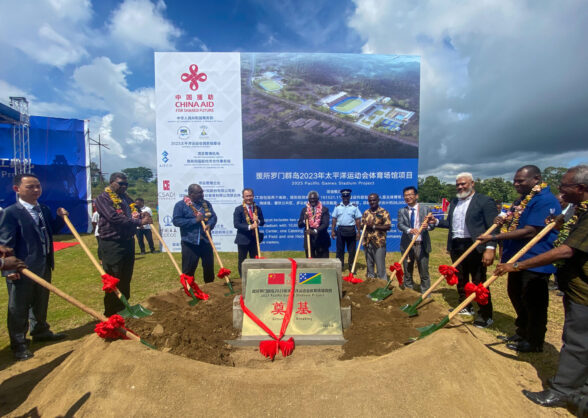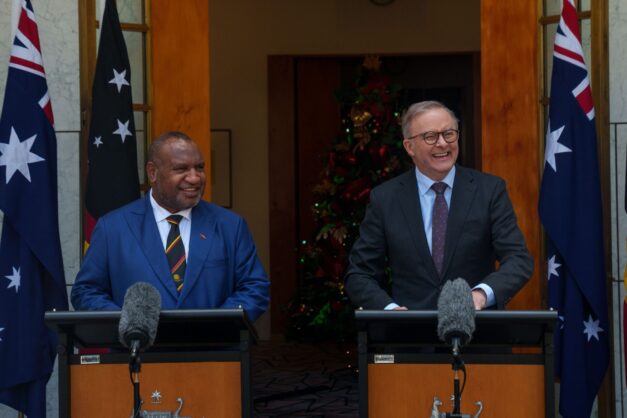The rejection of China’s deal shows the Pacific will not be used as a geopolitical pawn

A ground breaking ceremony of the 2023 Pacific Games Stadium Project is held in Honiara, capital of the Solomon Islands. Photo: Xinhua via AFP
Pacific leaders have sent a strong message that countries who want to partner with them must treat them with respect and take action on climate change, writes Henry Ivarature
Chinese foreign minister Wang Yi is nearing the end of a marathon tour of eight Pacific states. By Saturday, he will have visited Solomon Islands, Fiji, Kiribati, Samoa, Tonga, Vanuatu, Papua New Guinea, and Timor-Leste.
While Wang will come away with multiple bilateral economic and development agreements, he will not return to China with the big prize – a comprehensive security treaty, which would have seen a reconfiguration of the political landscape in the Pacific, which 10 Pacific states declined to sign at a virtual meeting on Monday.
Pacific leaders deliberated the Chinese proposal in the Pacific consensus decision-making way; carefully and sensitively weighing their decision, and – much to the relief of traditional partners – declined the proposal.
Clearly, China underestimated the collective response of the Pacific to an agreement that sought to secure their signatures lock, stock and barrel.
Some observers have attributed this to Australia’s new foreign minister Penny Wong’s intervention in Fiji on the tail of Wang’s stop-over.
The Chinese have said the blame lies with “a few people in these countries, under the pressure and coercion of the US and former colonizer”, which many have interpreted as aimed at the president of the Federated States of Micronesia who warned other Pacific leaders of the potential erosion of sovereignty and regional instability if they signed the deal.
But what the rejection of the deal by Pacific leaders really showed was an unequivocal display of not wanting to be used as pawns in a geopolitical contest, and a strong message to other actors to treat them with respect and work on the region’s key security threat: climate change.
Fiji’s prime minister Frank Bainimarama has been very blunt about this point, tweeting his thanks to both Wang and Penny Wong after her visit last week, while in the same breath pointedly urging China and Australia to act more decisively on the climate crisis.
“Geopolitical point-scoring means less than little to anyone whose community is slipping beneath the rising seas,” he said.
China, obviously, has not given up. And the region should expect a second diplomatic wave from Beijing.
China’s unprecedented economic growth has enabled a dictatorial state to extend its global influence across the world, and the Pacific is an integral part of its expansionist agenda. Pacific island countries’ economic exclusion zones (EEZ) account for roughly 28% of the world’s EEZs, meaning they have rights over a huge amount of the world’s marine resources, which we know clearly from the proposed regional deal China is very interested in.
Attempting to force a regional consensus the China-way, also ignored the role of the Pacific’s regional political body, the Pacific Islands Forum (PIF).
Things are currently tense within the forum. Last year, Micronesian members threatened to leave the region’s key diplomatic body, and China’s attempt to get 10 of the Pacific countries onboard with this deal – leaving out the Pacific countries that recognise Taiwan, mostly Micronesian countries – could have further widened the regional rift.
Samoa’s prime minister has said that China’s regional agreement ought to have been tabled at PIF and not at a sub-meeting, but one understands why China sought to circumvent this process: unlike Australia and New Zealand, China is not a PIF member, and if the deal was brought before all PIF countries, including those that diplomatically recognise Taiwan, the deal was even less likely to pass.
But it should not come as a surprise if we see China attempt to bring up this deal, or one like it, at the upcoming PIF meeting next month.
Australia should prepare for the next Chinese diplomatic wave in the Pacific, and work on building stronger, meaningful, and respectful relations with the Pacific.
Australia needs a more considered approach to the Pacific. It should let the dust created by Wang’s visit settle, and then build on Penny Wong’s visit by identifying opportunities for relationship-building in consultations with the Pacific. Pacific Islanders can tell their Australian and New Zealand friends what they need.
Australia must really learn to listen and listen well. Australia does not need to throw baskets of money into the Blue Pacific. I think for Pacific Islanders, it is relationships that matter and Australia needs to look to areas where its relations with the Pacific can grow and flourish. Australia should recognise China’s intensified engagement as an opportunity to rebuild its relations with Pacific, and a lesson not take the Pacific for granted.
Henry Ivarature
More Stories

Security Snapshot - 28 Mar 2024
Pacific Security Snapshot | 28 March 2024
Summary ➣ Heavy rains, floods, landslides and earthquakes batter the region ➣ Pacific submissions to the International Court of Justice (ICJ) on climate change responsibility ➣ Elections across the Pacific prompting changes to diplomatic relations and security arrangements ➣ Challenges for women in politics Climate Security Lives have been lost in PNG after a series…

Blog - 11 Dec 2023
A PNG-Australia security framework: not a treaty but solid nonetheless
Papua New Guinea PM James Marape and Australian PM Anthony Albanese face the media after signing a historical Bilateral Security Agreement on 7 December in Canberra. Credit: PM Albanese Facebook On 7 December 2023, the prime ministers of Australia and Papua New Guinea signed an historic security agreement in Canberra. It has taken approximately…






